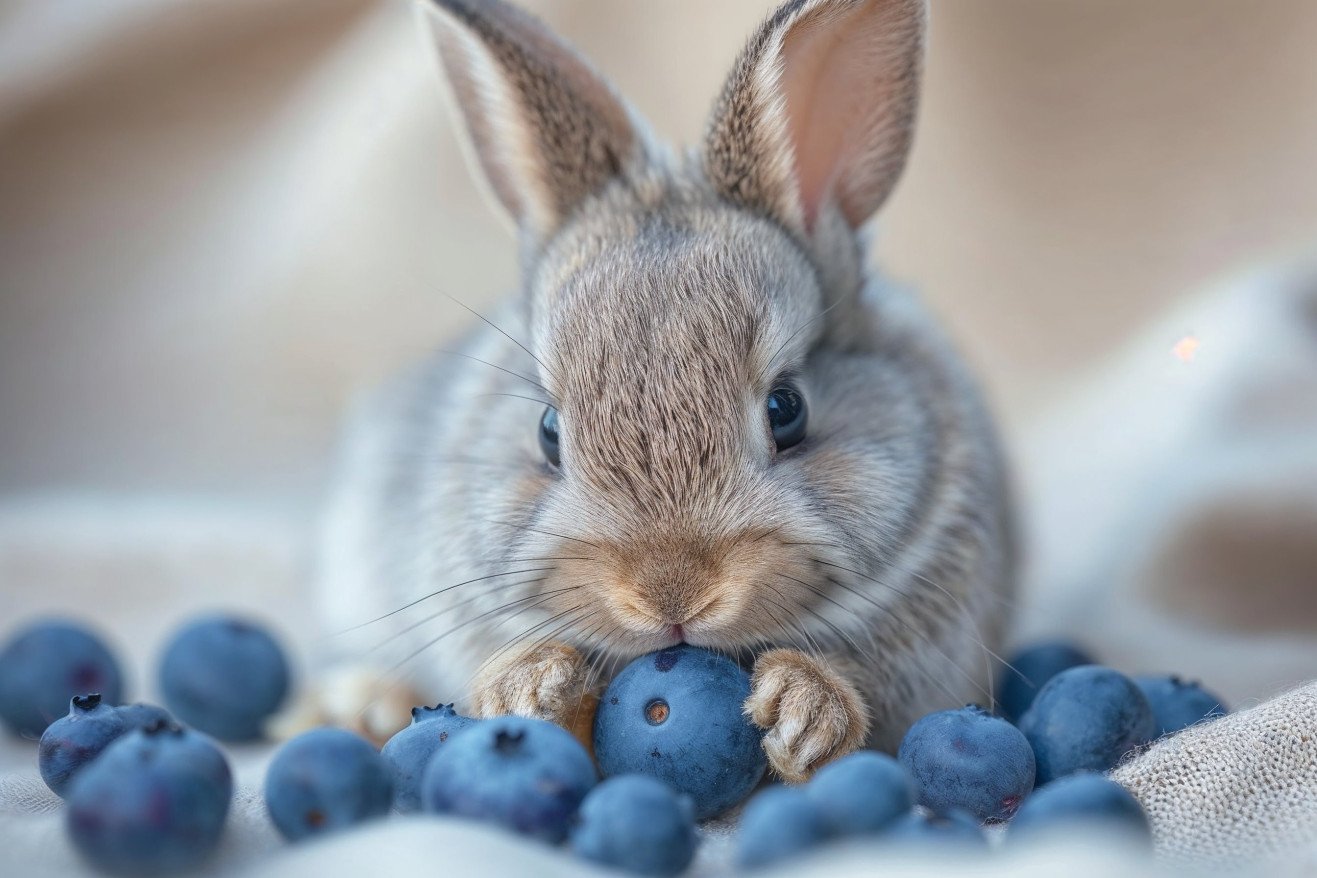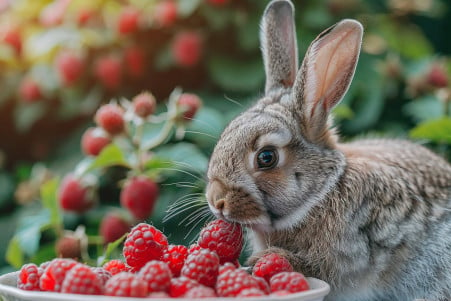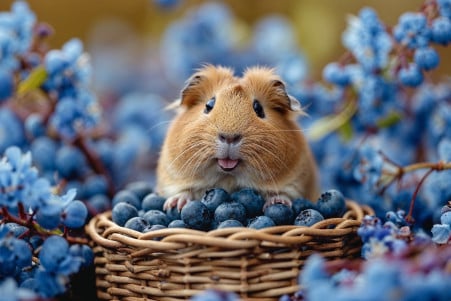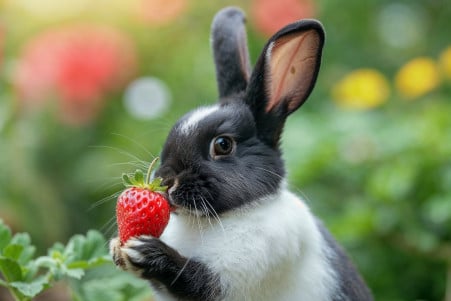Can Rabbits Eat Blueberries? A Complete Feeding Guide
31 January 2024 • Updated 6 February 2024

Blueberries are juicy and sweet, but are they a good choice for your rabbit? The answer is yes, rabbits can eat blueberries, but only as a treat and in moderation. Because blueberries are high in sugar, you’ll want to make sure that your rabbit doesn’t eat too many. In general, it’s best to limit your rabbit’s blueberry intake to one to two blueberries per week.
In this article, we’ll cover the most recent research from veterinary nutritionists and rabbit nutrition experts to help you better understand the pros and cons of feeding blueberries to rabbits.
We’ll also discuss research on rabbit digestion and the nutritional content of blueberries to give you a well-rounded view of where this delicious fruit fits into a rabbit’s diet. By learning about the delicate balance of a rabbit’s nutritional requirements, this article will help you make informed decisions about how to feed your pet rabbit.
Can rabbits eat blueberries?
Nutritional Value of Blueberries for Rabbits
Blueberries are packed with vitamins, minerals, and antioxidants, all of which are important for the health of people and animals. Blueberries are especially high in vitamins C and K, manganese, and a type of flavonoid called anthocyanins, which give blueberries their blue color, according to the University of Maine Cooperative Extension. However, anthocyanins are more than just a color; they are also antioxidants that help the body fight oxidative stress.
The nutritional profile of blueberries makes them a good fit for rabbits, as they are a good source of vitamins A and C, which are important for the immune system and overall health. Blueberries also contain fiber, which is important for rabbits’ digestive health, according to Healthline, although their sugar content means they should be fed in moderation.
While heating blueberries can reduce their vitamin and antioxidant content, the best way to preserve their nutrients is through individual quick freezing, according to the University of Maine Cooperative Extension. This is an important factor to keep in mind when determining how to feed blueberries to your rabbit so that they can get the most out of this nutritious fruit.
Antioxidants in Rabbit Nutrition
Oxidative stress is a condition that occurs when an animal, including rabbits, has an imbalance between free radicals and antioxidants. When free radicals are produced faster than the body can break them down, it can lead to oxidative damage, which can affect an animal’s health and even contribute to the development of certain diseases. Therefore, antioxidants are essential to an animal’s health because they can help prevent or minimize oxidative damage.
Rabbits can benefit from a diet that includes antioxidants. A study in the PubMed Central database found that animals with a high antioxidant status had better health and higher meat quality, showing the importance of antioxidants in animal nutrition. While this study focuses on livestock, the results can be applied to rabbits, suggesting that a diet high in antioxidants can help support their health.
Because blueberries are a natural source of antioxidants, including anthocyanins, they could be a good dietary supplement for rabbits. A study in the PubMed Central database found that anthocyanins from blueberries have a number of health benefits, including improving cardiovascular health and regulating glucose. This means that rabbits can benefit from eating blueberries in moderation, and it could help them live longer, healthier lives.
The Bottom Line: How to Feed Your Rabbit Blueberries
Blueberries are packed with nutrients that are beneficial to rabbits, including essential vitamins like vitamin C and K, and minerals such as manganese, according to Central Victoria Hay. These vitamins help boost rabbits’ immune systems and promote healthy eyes. Meanwhile, the antioxidants in blueberries, especially anthocyanins and flavanols, have been shown by Rabbit Care Tips to offer health benefits like better circulation and a reduced risk of certain diseases.
That said, there are also potential downsides to feeding your rabbit blueberries if you’re not careful. The fructose in blueberries can lead to digestive issues, dental problems, and obesity if rabbits eat too many of them. As a result, CharityPaws recommends giving rabbits no more than a couple of blueberries once a week, which shows that it’s important to use caution when feeding them this fruit.
To make sure your rabbit can handle blueberries, give them a small piece at first and then increase the amount while keeping an eye on their digestion.
It’s also important to make sure the blueberries are fresh by choosing ripe, thoroughly washed fruit and watching out for pesticides.
Meanwhile, the leaves and stems of the blueberry bush are safe for rabbits to eat, so you can use them as another way to introduce this new food into your rabbit’s diet. If you’re careful about how often you feed your rabbit blueberries and how many you give them at a time, you can make this fruit a safe and enjoyable part of their diet.
Rabbit Digestive Health and How It Relates to Blueberry Intake
Rabbits have a unique digestive system that has evolved to meet the needs of their herbivorous diet, and it is particularly well-suited to breaking down fibrous plant material. The Merck Veterinary Manual describes rabbits as concentrate selectors because they seek out nutrient-dense foods, but they need a diet that is high in long particle length fibers to keep their gut moving and maintain their digestive health.
The hindgut, which is an important part of their digestive system, ferments soluble fibers and absorbs nutrients.
Fiber is an essential part of a rabbit’s diet, and timothy hay provides the crude fiber that is necessary to keep the cecum and colon functioning properly. The Merck Veterinary Manual explains that it’s important to make sure that rabbits get a balanced intake of carbohydrates and proteins because too much of either can disrupt the cecum’s microbial population, which can lead to a variety of health problems.
Blueberries are nutrient-rich, but they also contain natural sugars that need to be managed in a rabbit’s diet to prevent digestive problems. According to ScienceDirect, a rabbit’s diet should be made up mostly of low-starch, high-fiber foods to prevent issues like enterotoxemia.
As a result, blueberries should be fed to rabbits in moderation and not as a regular part of their diet so that they can be part of a diet that supports the rabbit’s digestive health instead of throwing it off. This will allow rabbits to benefit from the antioxidants in blueberries without interfering with their specialized digestive system.
How to Make Sure Your Rabbit Is Getting the Right Nutrients
A rabbit’s diet should be centered around hay, which should make up at least 80% of their daily food intake, as it is essential for proper digestion. Fresh vegetables, which should make up about 10% of their diet, can help ensure that your rabbit is getting a variety of nutrients.
Best Friends Animal Society explains that rabbits need a well-rounded diet, so fruits like blueberries are fine, but they should be introduced slowly and only given as treats, not as a regular part of their diet.
While treats like blueberries can help ensure that your rabbit is getting a variety of nutrients, they should make up no more than 5% of your rabbit’s daily food intake, according to Rabbit.org.
Make sure to watch your rabbit’s response to new foods to make sure they don’t cause any issues with your rabbit’s sensitive digestive system. When introducing new foods, start with a small amount and watch your rabbit for 24 hours to make sure they don’t have any adverse reactions, including changes in behavior or stool.
There are some foods that you should never feed your rabbit to ensure their safety. Chocolate, avocados, and iceberg lettuce are all toxic to rabbits. The Spruce Pets also recommends avoiding foods that are high in sugar and starch to prevent digestive issues.
By following these recommendations, you can make sure that your rabbit is getting a well-rounded diet that will help support their health and happiness.
A Berry Good Choice: Can Rabbits Eat Blueberries?
Our exploration into the world of rabbits and their relationship with blueberries has been informative. We’ve discovered that blueberries are a healthy, nutrient-rich food for rabbits that can offer a range of vitamins and antioxidants, but they should only be given in moderation. We’ve also found out that the high sugar content of blueberries means that they should be fed to rabbits with caution.
We’ve also learned that it’s important to know the specific dietary needs of rabbits. A rabbit’s diet should be low in sugar and high in fiber, and blueberries can help support this balance if they are fed to rabbits in the right way. It’s also important to remember that it’s up to rabbit owners to make sure that their pets’ diets are as close to what they would eat in the wild as possible.
In conclusion, it’s clear that blueberries can be a healthy addition to a rabbit’s diet, providing them with both nutrition and taste. Good pet owners make sure that they are feeding their pets in a way that supports their health, and this includes feeding them a balanced diet.
By making sure that we only feed our rabbits blueberries in moderation and as part of a balanced diet, we can help ensure that they live long, healthy lives.


